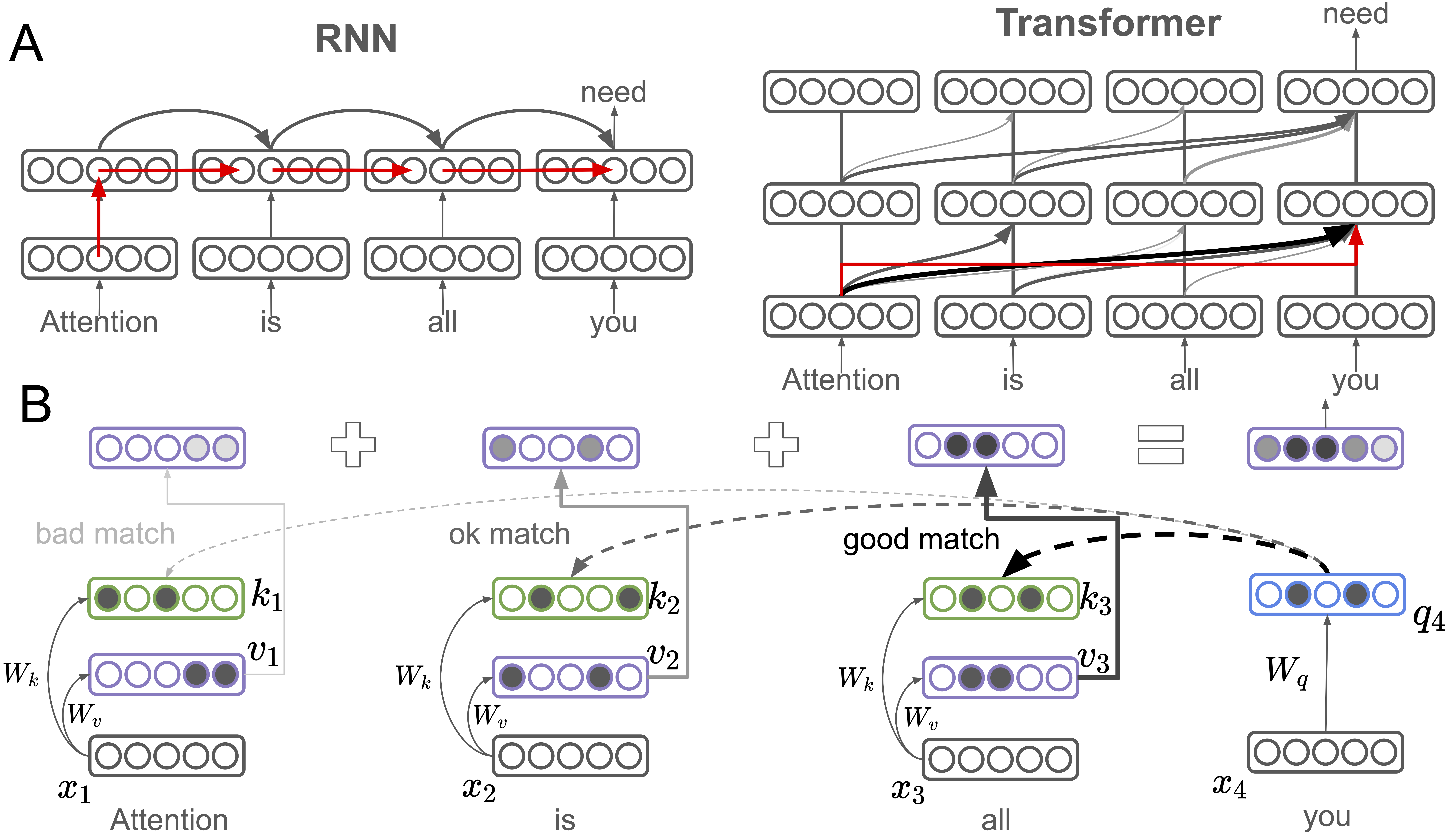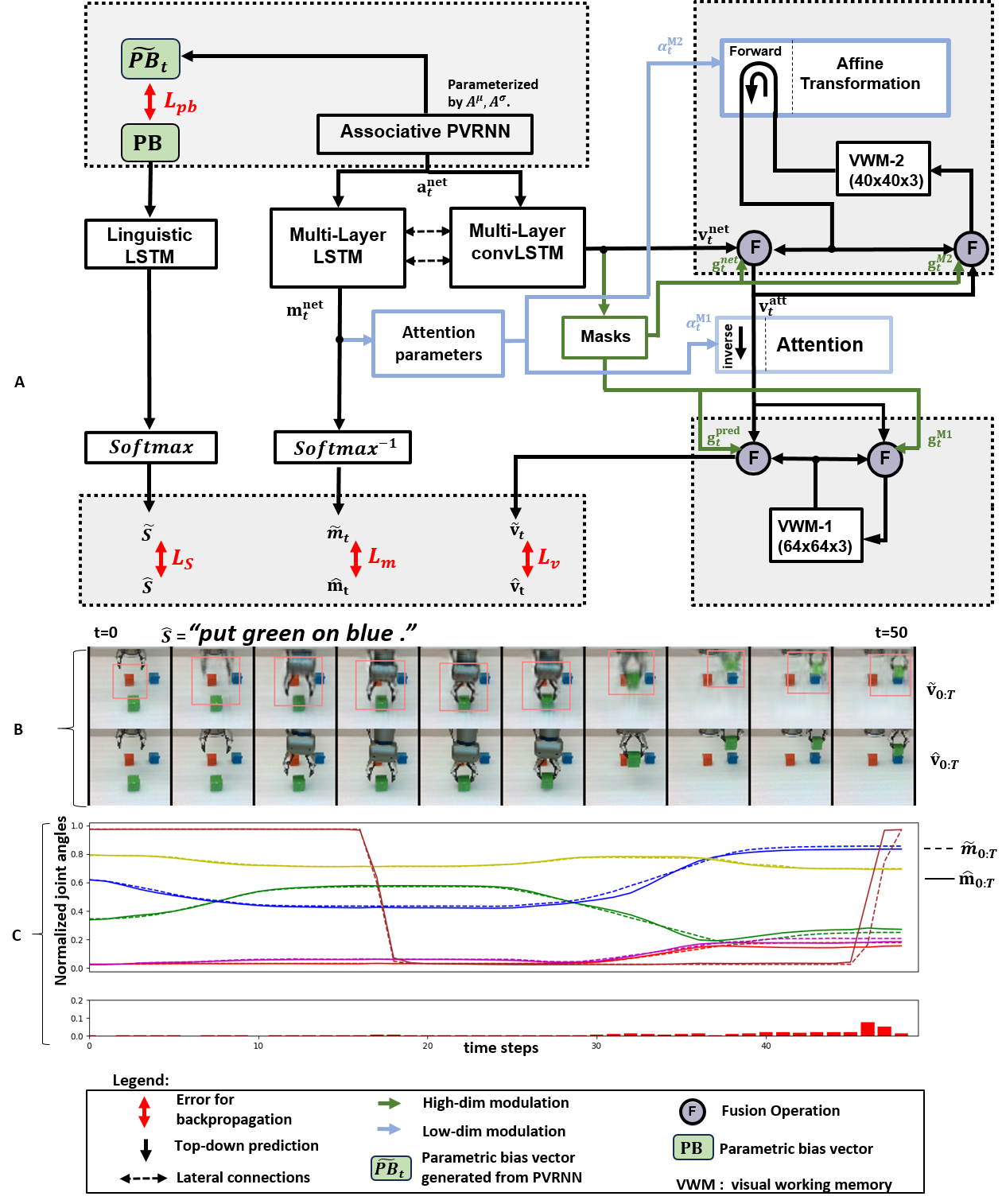A Survey on Compositional Learning of AI Models: Theoretical and Experimetnal Practices
2406.08787

0
0

Abstract
Compositional learning, mastering the ability to combine basic concepts and construct more intricate ones, is crucial for human cognition, especially in human language comprehension and visual perception. This notion is tightly connected to generalization over unobserved situations. Despite its integral role in intelligence, there is a lack of systematic theoretical and experimental research methodologies, making it difficult to analyze the compositional learning abilities of computational models. In this paper, we survey the literature on compositional learning of AI models and the connections made to cognitive studies. We identify abstract concepts of compositionality in cognitive and linguistic studies and connect these to the computational challenges faced by language and vision models in compositional reasoning. We overview the formal definitions, tasks, evaluation benchmarks, variety of computational models, and theoretical findings. We cover modern studies on large language models to provide a deeper understanding of the cutting-edge compositional capabilities exhibited by state-of-the-art AI models and pinpoint important directions for future research.
Create account to get full access
Overview
- This paper provides a comprehensive survey on the topic of compositional learning in AI models, exploring both theoretical and experimental practices.
- The authors examine different facets of compositional learning, including modular compositionality, linguistic compositionality, and developmental compositionality.
- The paper also delves into potential compositional deficiencies in large language models and proposes a general theory of compositional generalization.
Plain English Explanation
This research paper examines how AI models can learn to combine and recombine different concepts and skills in a modular way, a process known as compositional learning. The authors explore both the theoretical foundations and practical implementation of compositional learning in various AI systems.
One key aspect they look at is modular compositionality, where models are designed with distinct, interchangeable components that can be mixed and matched to solve different problems. The paper also discusses linguistic compositionality, which explores how AI systems can learn to understand and generate language in a more compositional manner, similar to how humans use language.
Additionally, the researchers investigate developmental compositionality, which looks at how AI models can gradually build up their compositional abilities through interactive learning, much like how children learn language and other skills.
The paper also identifies potential compositional deficiencies in large language models, where the models may struggle to truly understand and compose concepts in a modular way. The authors propose a general theory of compositional generalization to address these limitations and help AI systems become more flexible and adaptable in their problem-solving abilities.
Technical Explanation
The paper begins by outlining the different facets of compositional learning, including modular compositionality, linguistic compositionality, and developmental compositionality. The authors discuss the theoretical foundations and practical implementations of each of these aspects.
The paper then delves into the potential [object Object] of large language models, highlighting how these models may struggle to truly understand and compose concepts in a modular way. The researchers propose a [object Object] to address these limitations and improve the flexibility and adaptability of AI systems.
Critical Analysis
The paper provides a comprehensive and well-researched survey of the current state of compositional learning in AI, covering both theoretical and experimental aspects. However, the authors acknowledge that the field is still relatively young, and there are several areas that require further exploration and research.
One potential limitation discussed is the difficulty in precisely defining and measuring "compositional understanding" in AI systems, as it can be a subjective and complex concept. The authors also note that the proposed general theory of compositional generalization is still a work in progress and may require additional refinement and empirical validation.
Additionally, the paper does not extensively address the ethical considerations and potential societal implications of developing more compositional and flexible AI systems. As these technologies become more advanced, it will be crucial to consider their impact on issues such as transparency, accountability, and the displacement of human labor.
Conclusion
This paper offers a valuable and timely overview of the current research on compositional learning in AI, highlighting both the theoretical foundations and practical applications of this important field. By understanding the different facets of compositionality and addressing the compositional deficiencies in existing models, the authors pave the way for the development of more flexible, adaptable, and transparent AI systems that can better understand and interact with the world around them.
As the field of AI continues to rapidly evolve, the insights and frameworks presented in this paper will likely play a significant role in shaping the future of machine learning and its real-world applications.
This summary was produced with help from an AI and may contain inaccuracies - check out the links to read the original source documents!
Related Papers
🔍
What makes Models Compositional? A Theoretical View: With Supplement
Parikshit Ram, Tim Klinger, Alexander G. Gray

0
0
Compositionality is thought to be a key component of language, and various compositional benchmarks have been developed to empirically probe the compositional generalization of existing sequence processing models. These benchmarks often highlight failures of existing models, but it is not clear why these models fail in this way. In this paper, we seek to theoretically understand the role the compositional structure of the models plays in these failures and how this structure relates to their expressivity and sample complexity. We propose a general neuro-symbolic definition of compositional functions and their compositional complexity. We then show how various existing general and special purpose sequence processing models (such as recurrent, convolution and attention-based ones) fit this definition and use it to analyze their compositional complexity. Finally, we provide theoretical guarantees for the expressivity and systematic generalization of compositional models that explicitly depend on our proposed definition and highlighting factors which drive poor empirical performance.
5/7/2024

From Frege to chatGPT: Compositionality in language, cognition, and deep neural networks
Jacob Russin, Sam Whitman McGrath, Danielle J. Williams, Lotem Elber-Dorozko

0
0
Compositionality has long been considered a key explanatory property underlying human intelligence: arbitrary concepts can be composed into novel complex combinations, permitting the acquisition of an open ended, potentially infinite expressive capacity from finite learning experiences. Influential arguments have held that neural networks fail to explain this aspect of behavior, leading many to dismiss them as viable models of human cognition. Over the last decade, however, modern deep neural networks (DNNs), which share the same fundamental design principles as their predecessors, have come to dominate artificial intelligence, exhibiting the most advanced cognitive behaviors ever demonstrated in machines. In particular, large language models (LLMs), DNNs trained to predict the next word on a large corpus of text, have proven capable of sophisticated behaviors such as writing syntactically complex sentences without grammatical errors, producing cogent chains of reasoning, and even writing original computer programs -- all behaviors thought to require compositional processing. In this chapter, we survey recent empirical work from machine learning for a broad audience in philosophy, cognitive science, and neuroscience, situating recent breakthroughs within the broader context of philosophical arguments about compositionality. In particular, our review emphasizes two approaches to endowing neural networks with compositional generalization capabilities: (1) architectural inductive biases, and (2) metalearning, or learning to learn. We also present findings suggesting that LLM pretraining can be understood as a kind of metalearning, and can thereby equip DNNs with compositional generalization abilities in a similar way. We conclude by discussing the implications that these findings may have for the study of compositionality in human cognition and by suggesting avenues for future research.
5/27/2024

Development of Compositionality and Generalization through Interactive Learning of Language and Action of Robots
Prasanna Vijayaraghavan, Jeffrey Frederic Queisser, Sergio Verduzco Flores, Jun Tani

0
0
Humans excel at applying learned behavior to unlearned situations. A crucial component of this generalization behavior is our ability to compose/decompose a whole into reusable parts, an attribute known as compositionality. One of the fundamental questions in robotics concerns this characteristic. How can linguistic compositionality be developed concomitantly with sensorimotor skills through associative learning, particularly when individuals only learn partial linguistic compositions and their corresponding sensorimotor patterns? To address this question, we propose a brain-inspired neural network model that integrates vision, proprioception, and language into a framework of predictive coding and active inference, based on the free-energy principle. The effectiveness and capabilities of this model were assessed through various simulation experiments conducted with a robot arm. Our results show that generalization in learning to unlearned verb-noun compositions, is significantly enhanced when training variations of task composition are increased. We attribute this to self-organized compositional structures in linguistic latent state space being influenced significantly by sensorimotor learning. Ablation studies show that visual attention and working memory are essential to accurately generate visuo-motor sequences to achieve linguistically represented goals. These insights advance our understanding of mechanisms underlying development of compositionality through interactions of linguistic and sensorimotor experience.
4/1/2024
💬
Exploring the Compositional Deficiency of Large Language Models in Mathematical Reasoning
Jun Zhao, Jingqi Tong, Yurong Mou, Ming Zhang, Qi Zhang, Xuanjing Huang

0
0
Human cognition exhibits systematic compositionality, the algebraic ability to generate infinite novel combinations from finite learned components, which is the key to understanding and reasoning about complex logic. In this work, we investigate the compositionality of large language models (LLMs) in mathematical reasoning. Specifically, we construct a new dataset textsc{MathTrap}footnotemark[3] by introducing carefully designed logical traps into the problem descriptions of MATH and GSM8k. Since problems with logical flaws are quite rare in the real world, these represent ``unseen'' cases to LLMs. Solving these requires the models to systematically compose (1) the mathematical knowledge involved in the original problems with (2) knowledge related to the introduced traps. Our experiments show that while LLMs possess both components of requisite knowledge, they do not textbf{spontaneously} combine them to handle these novel cases. We explore several methods to mitigate this deficiency, such as natural language prompts, few-shot demonstrations, and fine-tuning. We find that LLMs' performance can be textbf{passively} improved through the above external intervention. Overall, systematic compositionality remains an open challenge for large language models.
5/14/2024